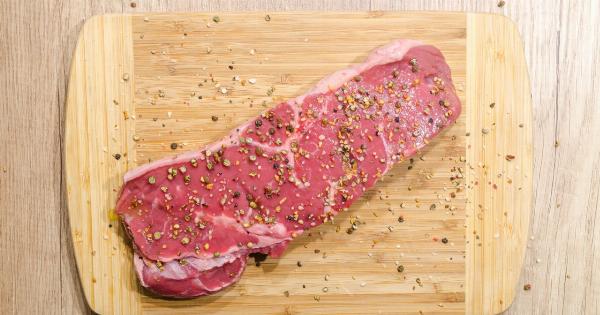As pet owners, we always strive to keep our furry friends healthy and happy. One common concern among dog owners is their dental health. Just like humans, dogs can also suffer from dental issues if proper care is not taken.
While regular brushing and professional cleanings are crucial, many pet parents wonder if natural remedies can help maintain their dog’s dental hygiene. One such remedy that often comes up is carrots. But do carrots really clean a dog’s teeth? Let’s explore this further.
The Importance of Dog Dental Health
Before we dive into the effectiveness of carrots as a dental cleaning agent for dogs, let’s first understand why dental health is vital for our furry companions. Dogs, like humans, are prone to plaque and tartar buildup on their teeth.
If left untreated, this can lead to various oral health problems such as bad breath, gum disease, tooth decay, and even tooth loss.
Poor dental hygiene in dogs can also have consequences beyond their oral health. Bacteria from oral infections can enter the bloodstream and potentially affect vital organs like the heart, liver, and kidneys.
Additionally, dental pain and discomfort can lead to behavioral changes, affecting a dog’s overall well-being.
The Benefits of Carrots
Carrots are commonly recommended as a natural remedy for maintaining a dog’s dental health. Here are some reasons why carrots are believed to be beneficial:.
1. Crunchy Texture
Carrots have a firm and crunchy texture that can help remove plaque and tartar buildup on a dog’s teeth. When dogs chew on carrots, the texture can act as a natural abrasive, scraping away the debris from their teeth.
2. Natural Toothbrush
The fibrous nature of carrots makes them work similarly to a toothbrush. As dogs bite and chew on carrots, the fiber strands can help brush against the teeth, providing a mild scrubbing action.
This action may help dislodge food particles and promote cleaner teeth.
3. Promotes Saliva Production
Chewing on carrots can stimulate saliva production in dogs. Saliva plays a crucial role in maintaining oral health by neutralizing acids, washing away food particles, and inhibiting the growth of harmful bacteria.
Increased saliva production can contribute to better oral hygiene for dogs.
The Limitations of Carrots
While carrots offer some potential benefits, it’s essential to understand their limitations as a standalone dental cleaning solution for dogs:.
1. Not a Substitute for Professional Dental Care
While carrots can contribute to maintaining a dog’s dental health, they should not replace professional preventive dental care.
Regular veterinary check-ups and dental cleanings performed by a veterinarian are still necessary to ensure comprehensive oral care for your furry friend.
2. Inability to Reach all Areas
Carrots, no matter how well chewed, may not effectively navigate between the teeth or reach the back molars. Plaque and tartar often accumulate in these hard-to-reach areas, and carrots alone may not be sufficient to clean them thoroughly.
3. Moderation is Key
While carrots are generally safe for dogs to eat, they should be fed in moderation. Too many carrots can contribute to an imbalance in a dog’s diet due to their high fiber content.
It is important to strike a balance between dental health and overall nutritional needs.
Alternate Dental Care Options
While carrots can be a part of your dog’s dental care routine, it’s crucial to consider other options as well. Here are a few alternatives to help maintain your dog’s dental health:.
1. Regular Brushing
Regular brushing using a toothbrush and toothpaste specifically formulated for dogs is one of the most effective ways to prevent dental problems. Aim to brush your dog’s teeth at least two to three times a week.
Patience, positive reinforcement, and gradual introduction to brushing can make the process more enjoyable for both you and your dog.
2. Dental Chews and Treats
Dental chews and treats can provide additional support for your dog’s dental hygiene routine. Look for products that have the Veterinary Oral Health Council (VOHC) seal of approval, as they meet specific standards for reducing plaque and tartar.
3. Water Additives
Water additives formulated for oral health can be added to your dog’s drinking water. These additives help fight bacteria and reduce plaque formation, promoting better dental hygiene.
4. Prescription Diets
Some dog food brands offer prescription diets specially formulated to promote dental health. These diets typically have a larger kibble size or a specific texture that aids in plaque removal as dogs chew the food.
Consulting a Veterinarian
It’s important to remember that every dog is unique and may have different dental care needs.
Therefore, it is advisable to consult a veterinarian to assess your dog’s dental health and discuss the most suitable options for their specific requirements.
In Conclusion
While carrots can be a part of your dog’s dental care routine, they should not be considered a standalone solution. They can help scrape away plaque, promote saliva production, and provide some mild abrasive action, but they do have limitations.
Regular professional dental care, along with a comprehensive dental hygiene routine, including brushing, dental chews, water additives, and possibly prescription diets, should be taken into consideration for optimal dental health in dogs.































